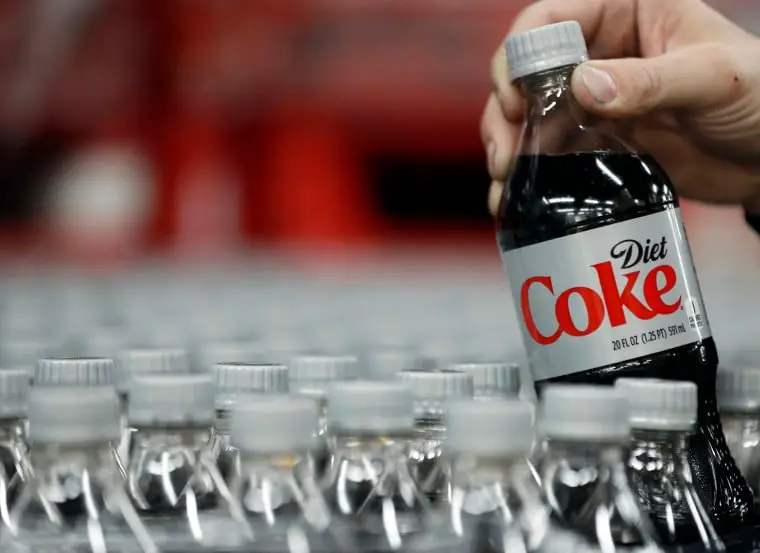The World Health Organization’s International Agency for Research on Cancer announced Thursday that the artificial sweetener aspartame, commonly found in Diet Coke and other sugar-free foods, is a possible carcinogen.
However, a second WHO panel, the Expert Committee on Food Additives, hasn’t changed its threshold for the daily amount of aspartame that’s safe to consume: 40 milligrams for adults weighing about 154 pounds—the amount in about 14 cans of Diet Coke. The Food and Drug Administration has a slightly upper limit of 50 milligrams per day for an adult weighing approximately 132 pounds.
It’s a slight warning to people, but it’s not do not consume, Barry Popkin, a professor of nutrition at the University of North Carolina’s Gillings School of Global Public Health, said of the WHO’s decision. Consume moderate levels and you’re fine.
Found in more than 5,000 foods and drinks, aspartame is much sweeter than sugar. In 1974, the FDA approved its use as a tabletop sweetener and ingredient in gums, cereals, instant coffee, dairy products, and other items. Common foods and drinks with aspartame include:
- Tabletop sweeteners, including NutraSweet, Equal and Sugar Twin.
- Beverages and drink mixes, such as Diet Coke, Coke Zero, Diet Snapple, Fanta Zero, Sprite Zero, Crystal Light and Wylers Light.
- Sugar-free gum, including Trident, Extra, Wrigleys and Mentos gum.
- Gelatin products, including sugar-free Jell-O and Royal Gelatin.
- Syrups, including Mrs. Butterworths Sugar-Free Syrup and Log Cabin Sugar-Free Syrup.
What research says about cancer risk and aspartame
WHO has placed aspartame in a lower risk category than the other two: carcinogenic to humans and possibly carcinogenic. Other substances in the category of possible carcinogens include aloe vera, pickled vegetables and nickel.
Past research into the link between aspartame and cancer hasn’t provided conclusive evidence that it causes the disease, and many studies investigating the links between cancer and artificial sweeteners have been based on animals, not humans, Popkin said.
A 2020 study, for example, found an increased incidence of leukemia and lymphoma in mice that consumed aspartame but the doses were nearly quadruple the weight of the mice, Popkin said, making them a poor benchmark for the human risk. Meanwhile, studies from the 1980s found that aspartame didn’t cause brain tumors or bladder cancer in rats.
A 2022 study of more than 100,000 adults in France, however, found that consuming large amounts of artificial sweeteners was linked to a slightly higher risk of cancer.
Artificial sweeteners can carry other health risks
While the WHO announcement may appear to imply that aspartame is worse than other artificial sweeteners, Popkin said, it could all be linked to adverse health effects.
Frankly, I think it’s such a trivial difference that all dietary sweeteners should be treated the same, Popkin said. But if you’re consuming 10 Diet Cokes or 10 Diet Pepsis in a day, you shouldn’t. You have to cut back, because it’s definitely in excess and that shifts towards potential carcinogenic levels.
Past research has linked artificial sweeteners to a higher chance of heart disease, high blood pressure, diabetes and obesity.

In May, WHO advised against consuming artificial sweeteners as a weight-loss strategy, as they have not been shown to reduce body fat over the long term.
If you’re drinking 32 ounces to 64 ounces of soda a day, it’s probably better to have these artificially low-calorie sweeteners than to drink so much added sugar, said Dariush Mozaffarian, professor of nutrition at Tufts University. On the other hand, I wouldn’t just consider them a 100% safe blanket. I would avoid them as much as possible.
The 2022 study in France found that people who consumed aspartame were at an increased risk of stroke and that replacing added sugar with artificial sweeteners did not reduce the risk of heart disease.
In another study published last year, Israeli researchers found that artificial sweeteners altered participants’ gut microbe populations.
It’s best to eat a natural, healthy diet with foods that are naturally sweet, Mozaffarian said. So I think of these artificial sweeteners as a bridge away from very large doses of added sugar, but not necessarily a safe pass.
#foods #aspartame #Artificial #sweetener #considered #carcinogen
Image Source : www.nbcnews.com